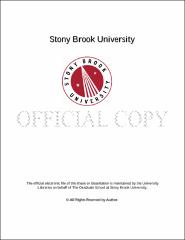| dc.identifier.uri | http://hdl.handle.net/11401/76774 | |
| dc.description.sponsorship | This work is sponsored by the Stony Brook University Graduate School in compliance with the requirements for completion of degree. | en_US |
| dc.format | Monograph | |
| dc.format.medium | Electronic Resource | en_US |
| dc.language.iso | en_US | |
| dc.publisher | The Graduate School, Stony Brook University: Stony Brook, NY. | |
| dc.type | Dissertation | |
| dcterms.abstract | Political scientists and pundits alike have characterized the American electorate as being increasingly polarized in recent decades. This polarization has been framed in the context of the " culture war," where party elites and citizens have become more ideologically divided on salient social issues. Recent contributions by political scientists suggest that the sources of " culture war" polarization are more deeply rooted in individual traits, and that partisan polarization represents a " worldview evolution" that has split citizens into Democratic and Republican camps on the basis of their needs for order, certainty, and security - conceptualized as authoritarianism. This argument hinges on an acceptance that, as Republicans increasingly supported more conservative positions on cultural issues such as gay rights, the war on terrorism, and abortion, authoritarians identified more with the Republican Party. This line of work, while acknowledging the link between personal predispositions and ideological preferences, does not provide a theoretical mechanism that explains why authoritarianism has come to structure political polarization. In this dissertation, I propose and empirically test a theoretical mechanism that explains why ideological polarization in contemporary American politics is structured by authoritarian dispositions, by incorporating aspects of social identity theory. I argue that authoritarianism is a group-based construct wherein individuals seek to establish social order through overlapping group and political identities. By conceptualizing authoritarianism in these terms, I explore how shifts in party leadership cohesion, ideological sorting, and demographic composition affected the ways in which people with varying levels of authoritarianism relate to politics. Empirically, I rely on survey-based approaches and quantitative methods for testing my theoretical model, and provide evidence that 1) authoritarianism differentially predicts how individuals perceive their partisan identity as cohesively encompassing their other social identities, 2) authoritarian dispositions, moderated by elite-level shifts in demographic homogeneity, have affected large-scale partisan sorting over the past 40 years, and 3) authoritarian dispositions lead to intense partisan attachments and ideologically extreme issue preferences, as mediated by individuals' perceptions of their party as a cohesive, singular entity, regardless of which ideological belief systems are shared among co-partisans. | |
| dcterms.available | 2017-09-20T16:51:10Z | |
| dcterms.contributor | Huddy, Leonie | en_US |
| dcterms.contributor | Feldman, Stanley | en_US |
| dcterms.contributor | Lebo, Matthew | en_US |
| dcterms.contributor | Hetherington, Marc. | en_US |
| dcterms.creator | Wronski, Julie Ann | |
| dcterms.dateAccepted | 2017-09-20T16:51:10Z | |
| dcterms.dateSubmitted | 2017-09-20T16:51:10Z | |
| dcterms.description | Department of Political Science. | en_US |
| dcterms.extent | 163 pg. | en_US |
| dcterms.format | Application/PDF | en_US |
| dcterms.format | Monograph | |
| dcterms.identifier | http://hdl.handle.net/11401/76774 | |
| dcterms.issued | 2014-12-01 | |
| dcterms.language | en_US | |
| dcterms.provenance | Made available in DSpace on 2017-09-20T16:51:10Z (GMT). No. of bitstreams: 1
Wronski_grad.sunysb_0771E_11942.pdf: 2867661 bytes, checksum: d18803c12752fbed7efa211e62be7c01 (MD5)
Previous issue date: 1 | en |
| dcterms.publisher | The Graduate School, Stony Brook University: Stony Brook, NY. | |
| dcterms.subject | Political Science | |
| dcterms.title | The Authoritarian Party Identity and Its Impact on American Political Polarization | |
| dcterms.type | Dissertation | |

